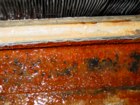The perils of cutting maintenance costs

Dirty filters prevent an air-conditioning system performing correctly and can lead to costly failures
Planned maintenance increases energy efficiency and provides a cleaner environment, says John Wright.Cleanliness is next to godliness, but it can also prevent facilities managers from ending up in court. When will companies learn that cutting back on ductwork hygiene and HVAC maintenance is a false economy and exposes a company and its employees unnecessarily? When cost savings have to be achieved, it is always maintenance and training under the hammer as they have no immediate business impact. However, neglecting a building’s facilities, including the service and maintenance of HVAC plant, has cumulative and far-reaching effects.
Impurities The workplace regulations introduced in 1992 require every employer and every building owner to ensure that air introduced should as far as possible be free of any impurities that are likely to be offensive or cause ill-health. This means that mechanical ventilation systems should have effective filtration and be regularly and effectively cleaned. Equipment inevitably becomes less energy efficient as it gets older, but regular maintenance can maximise performance levels and may extend its durability. It is only when parts inevitably start to malfunction and repair bills keep appearing that companies finally appreciate that cutting back or, even, dispensing with a maintenance contract is a false economy. Yet many companies that have made a substantial capital investment in their plant cut corners when it comes to maintenance.
 |
Bacteria in a ventilation or air-conditioning system can pose serious health hazards. |
Air-conditioning systems that are not regularly maintained are not operating at peak performance — resulting in low comfort levels for the building’s occupants and also compromising a company’s commitment to energy efficiency, increasing exposure to fire risks, raising costs, and adversely affecting morale, health, safety and productivity. In the worst-case scenario, litigation can also become a major issue. All companies are legally obliged to exercise a duty of care, which means that someone within an organisation is ultimately responsible and liable if an employee has an accident or is fatally injured. Ignorance of the law is not an excuse.
Host of problems When maintenance is taken off the priority list, there will be no immediate impact in the first three months — if a company is lucky. However, gradually faults will develop and can include a host of problems, including, not least, filters clogging up and coils in desperate need of a clean. Clean coils increase the effectiveness and the service life of an air-conditioning system. Dirt building up on a coil it acts an as insulator and affects its ability to function. After a period of time, the system has to work harder to achieve the same cooling effect, which increases energy consumption and stress on the other components — particularly the compressor, which inevitably starts more frequently. The greatest strain on any component or system with moving parts is generally when it starts up. If compressors or fan motors are constantly stopping and starting needlessly because of lack of proper maintenance, the life span of the component is reduced.
Costly failures Air hygiene is a major consideration, and air-quality measurements are becoming commonplace. Air needs to be clean and filtered correctly. Dirty filters prevent an air-conditioning system performing correctly and can lead to costly failures. Filters need to be routinely cleaned or replaced. Clogged filters block the normal airflow and reduce a system’s efficiency significantly. With the normal airflow obstructed, any air that bypasses the filter may carry dirt directly into the evaporator coils and impair their heat-absorbing capacity. If left unattended, filters become coated in a concentration of whatever contaminants and assorted particles are present within the surrounding environment. They then start to break down altogether, resulting in any detritus going straight into the ductwork and the conditioned space — causing a potential health hazard. More visual indications of potential problems include grimy deposits on supply grilles. Rooftop fresh-air intakes can be exposed to many unpalatable conditions. Vermin, wasps and flies can, if appropriate precautions are not taken and adhered to, can find their way onto the filter media, which needs to be replaced at regular intervals. Rooftops and plant compounds readily offer a safe haven for pigeons. Their excrement, if left, decays, breaks down and can find its way onto the filter media and could ultimately be transported through ductwork and possibly inhaled by a building’s occupants. Typically, problems arise in peak periods such as the onset of winter or mid-summer when the problems can be exacerbated by the lack of available service engineers, who are already locked into other contractual obligations. Although a short-term fix and one-off cost, reactive maintenance does not prevent further breakdowns and more engineer call outs.
Planned maintenance Only regular planned preventative maintenance (PPM) carried out by qualified and competent engineers will keep the plant running reliably until it can be refurbished or replaced. The quality of any installation and its maintenance should be the highest priority, because quality will determine energy, cost, safety and health.
John Wright is general manager of Eaton-Williams Service Ltd. Bacteria in a ventilation or air-conditioning system can pose serious health hazards.
Related links:




